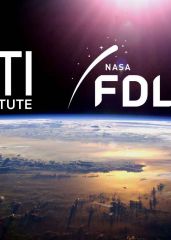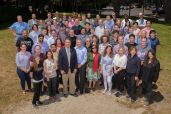AI Accelerator to Focus on Key Challenges in Space Resources, Astrobiology, Space Weather, And Exoplanets to Benefit the Space Program and Humanity
(Mountain View, CA, June 26, 2018) The NASA Frontier Development Lab (FDL) has announced it will apply artificial intelligence (AI) to four key space challenges. FDL is an AI/machine learning research accelerator powered by a public/private partnership between NASA, the SETI Institute, commercial leaders in AI, and pioneers in the private space industry.
Entering its third year, FDL is building on a successful track record by expanding its focus to four key research areas: Space Resources, Astrobiology, Exoplanets, and Solar Weather. The final results of FDL 2018 will be presented at Intel in Santa Clara on August 16th.
“This year, we have 50 phenomenally talented researchers and mentors from AI and the space sciences tackling these critical challenges to the space program,” said Dr. Dan Rasky, Chief, Space Portal, NASA's Ames Research Center in Silicon Valley. “We’re excited that NASA is able to convene a group like this. AI is a game changer for space exploration and we’re looking forward to some fascinating results.”
There is mounting excitement around the potential for great progress within each of the designated challenge areas. According to Bill Diamond, President and CEO at the SETI Institute, “The NASA FDL researchers are taking on some fascinating challenges. For example, can we find a way to predict solar weather? Can we get better at discovering new exoplanets and possibly even new forms of life? Can we enable multiple rovers to work together to effectively explore for resources like water on the moon?” Diamond continued, “These are great questions. We are excited to see some answers begin to emerge in this year’s program.”
NASA FDL is a compelling example of how public/private partnerships can yield significant results. Hosted at the SETI Institute, the NASA FDL program pairs researchers from the space sciences with data scientists for an intense eight-week concentrated sprint, supported by leaders in AI, such as Intel, Google, Kx Systems, IBM and NVIDIA and key players in private space such as SpaceResourcesLu, Lockheed Martin, KBRWyle and XPRIZE.
NASA FDL has consistently demonstrated the potential of applied AI to create useful results in accelerated time periods. According FDL Director James Parr, “We are proud of our achievements to date, and we expect even more from this year’s challenges. NASA FDL researchers have shared their results at numerous professional conferences, in both the AI and space science domains, and papers from 2016 and 2017 are being published in peer-reviewed journals. Moreover, functioning AI workflows from FDL are being deployed on NASA funded activities - including detecting long period comets.”
The Frontier Development Lab is the latest NASA sponsored activity to push the boundaries of state-of-the-art in computing - specifically applied artificial intelligence - to assist in solving knowledge gaps in space science and exploration relevant to NASA and humankind.
The space program and computing have a long history of advancement for mutual benefit. The push for miniaturization in the late 60’s, helped catalyze the development of the microprocessor which took humanity to the Moon. The Apollo Moonshots were also responsible for error-free software architectures which made computers reliable in deep space, but also credible everyday tools. More recently, NASA originated ‘camera-on-a-chip’ technology resides inside many smartphones and now, self-driving cars.
To learn more about FDL, the 2018 challenge questions and to follow our 2018 program please visit the FDL website at www.frontierdevelopmentlab.org.
- - - - - - - - -
About the NASA Frontier Development Lab (FDL)
Hosted in Silicon Valley by the SETI Institute, the NASA FDL is an applied artificial intelligence research accelerator developed in partnership with NASA's Ames Research Center. Founded in 2016, the NASA FDL aims to apply AI technologies to challenges in space exploration by pairing machine learning expertise with space science and exploration researchers from academia and industry. These interdisciplinary teams address tightly defined problems and the format encourages rapid iteration and prototyping to create outputs with meaningful application to the space program and humanity.
About the SETI Institute
Founded in 1984, the SETI Institute is a non-profit, multi-disciplinary research and education organization whose mission is to lead humanity’s quest to understand the origins and prevalence of life and intelligence in the Universe and to share that knowledge with the world. Our research encompasses the physical and biological sciences and leverages expertise in data analytics, machine learning and advanced signal detection technologies. The SETI Institute is a distinguished research partner for industry, academia and government agencies, including NASA and NSF.
Contact information
James Parr
FDL Director
Frontier Development Lab
james@frontierdevelopmentlab.org
www.frontierdevelopmentlab.org
Rebecca McDonald
Director of Communications
SETI Institute
189 Bernardo Ave., Suite 200
Mountain View, CA 94043
rmcdonald@seti.org
www.seti.org







